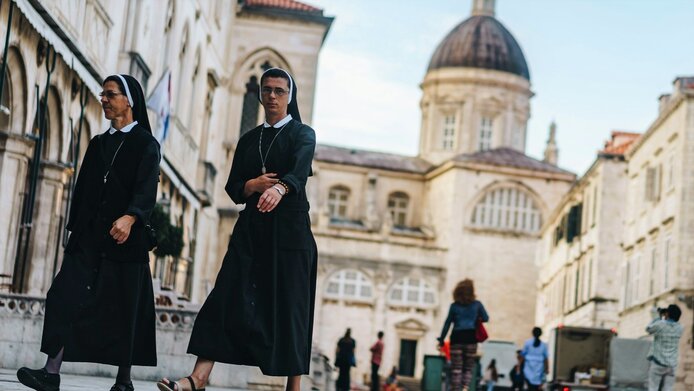How Catholics and Evangelicals navigate gender issues

Gender issues are the new hot-button topic for religious groups. Austrian legislation on issues such as gender policy and equality, abortion or same-sex marriage is often viewed critically not only in the Roman Catholic Church, but also in Austria‘s growing number of evangelical groups. Ultimately faith forms the basis for both communities for arguing and legitimizing their stances, whether in favor or in opposition. Preparations are underway at the Universities of Graz and Innsbruck to carry out the first comprehensive empirical study of Roman Catholic and Evangelical groups in Austria against the backdrop of these tensions between politics and religion. With the support of the Austrian Science Fund FWF, research is being conducted into how the religious communities differ or even agree on how they negotiate gender issues.
Exploring gender issues
A team led by religious studies scholar Nicole Bauer from the University of Graz is working on an interdisciplinary basis with Andrew Doole, head of the Department of Biblical Studies and Historical Theology at the University of Innsbruck. Together, they are investigating how social and societal issues are negotiated, such as the ordination of women, contraception, abortion, homosexuality and the marriage of same-sex couples. Until now, these discourses have mainly been examined theologically, i.e. from an internal perspective. “We now plan to examine how political decisions are received in these two religious communities from a cultural and social science perspective, how the two groups react to these decisions, discuss them and feed their responses back into the political sphere. We are undergoing thorough preparations for fieldwork, also keeping key issues such as data protection and data processing in mind. After all, religious practice is a highly personal aspect of life,” emphasizes project manager Nicole Bauer. The first step was to identify and contact ten large groups, five per denomination, which have members throughout Austria.
Value-neutral approach
The researchers are relying on a multi-method approach. This includes content analyses of primary sources such as the communities’ websites, podcasts, YouTube appearances and popular science publications. In addition, questionnaires were drawn up for conducting qualitative and quantitative interviews with leaders and members. The community’s views and approach to gender roles, images of women, abortion, queerness and same-sex marriage, as well as adoption and artificial insemination are all part of the survey. Participant observation at church services, prayer groups and community events will also be considered in the analysis. Roman Catholic and Evangelical groups are usually very different from each other, but in the current political environment they may unexpectedly see themselves as allies, theorize the researchers.
Distribution in Austria
The Catholic religious community, historically the strongest in Austria, is undergoing a transformation, with a growing women’s and LGBTIQ movement and with more liberal and more conservative tendencies, even considering the Vatican’s statement on the blessing of homosexual couples in 2023. The Evangelical churches in Austria, which are very active but still constitute a minority, are still considered to have little “agency”, the scientific term for the ability to exert political and social influence. Statistics Austria puts the proportion of Roman Catholics in the country at 55.2 percent of the total population in 2022. In German-speaking countries, a large proportion of non-denominational churches, also known as free churches, which have been recognized in Austria since 2013, are Evangelical. They are united in the Federation of Evangelical Churches (BEG), which currently lists around 60 churches in all nine federal provinces. The Free Church Atlas lists four times as many groups. Statistics Austria estimates that people in “other religion, denomination or faith communities” account for 5.3 percent of the population.
Unlike the Roman Catholic faith community with its headquarters at the Vatican, Evangelical communities have a decentralized organizational structure. Important principles are the free and personal decision to come to the Christian faith as young people or adults, a strong community and group cohesion around a (usually male) leader, as well as a direct relationship with God. An interesting special case in Austria is the Catholic movement “Loretto”, which operates cross-regionally and nationwide. The research will also focus on how these kinds of religious communities influence each other and will run until the end of August 2026.
Personal details
Nicole Bauer is a researcher at the Institute for Religious Studies at the University of Graz and a Research Fellow at the Department of Biblical and Ancient Studies at the University of South Africa. She studied sociology and religious studies at the Universities of Graz and Heidelberg. Study and research visits have taken her to the University of Jewish Studies in Heidelberg, the Hebrew University in Jerusalem, the Athenaeum Pontificium Regina Apostolorum in Rome and the University of South Africa in Pretoria. The project "Gender and the Bible" (2023–2026) receives EUR 374,000 in funding from the Austrian Science Fund FWF.





